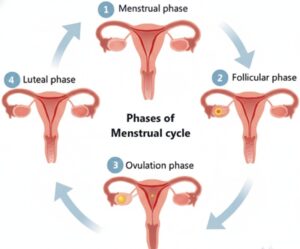Heavy Periods - Everything You Need to Know About (Menorrhagia)

Heavy periods disrupt your life and can leave you feeling drained.
Menorrhagia, also known as heavy menstrual bleeding, can be a challenging issue for many women.
Read on as we will explore everything you need to know about menorrhagia, from understanding the causes to exploring treatment options and practical tips for coping with heavy periods.
Understanding Menorrhagia: What is it?
Menorrhagia, a condition characterised by heavy menstrual bleeding, is more than just a minor inconvenience for many women. It goes beyond the normal flow and duration of periods, causing significant physical and emotional distress.
Women with menorrhagia often find themselves changing pads or tampons frequently, experiencing fatigue due to blood loss, and dealing with intense cramps.
The excessive bleeding associated with menorrhagia can interfere with daily activities and quality of life. It’s essential to differentiate between normal period flow and abnormally heavy bleeding to seek appropriate medical attention if needed. Understanding the underlying causes of menorrhagia is crucial in managing this condition effectively.
What causes heavy bleeding during periods?
Heavy bleeding during periods, also known as menorrhagia, can be caused by various factors.
- One common cause is hormonal imbalances, where the levels of estrogen and progesterone are not in sync. This imbalance can lead to a thicker uterine lining, resulting in heavier bleeding when shed during menstruation.
- Another potential cause of heavy menstrual bleeding is uterine fibroids or polyps. These non-cancerous growths in the uterus can disrupt the normal flow of menstrual blood and cause excessive bleeding.
- Conditions such as endometriosis or adenomyosis may also contribute to heavy periods.
- Medications like blood thinners or some hormonal contraceptives could increase menstrual flow.
- In certain cases, underlying health issues such as thyroid disorders or pelvic inflammatory disease could be responsible for heavy bleeding during periods.

Signs You're Losing Too Much Blood During Your Period
Heavy menstrual bleeding can present in several ways, including:
- Extended Periods: Menstrual cycles that last longer than seven days.
- Large Blood Clots: Passing clots the size of a quarter or larger more than once or twice. These clots can appear in shades, from red and pink to brown or rust-like.
- Frequent Changes: Bleeding heavily enough to soak through 1 or more pads or tampons each hour for more than two consecutive hours.
- Nighttime Changes: Having to get up in the middle of the night to change your pad or tampon.
- Double Protection: Using multiple pads or tampons at once to prevent leaks.
- Excessive Blood Loss: Losing more than 5 tablespoons of blood during your period, compared to the typical 2 to 3 tablespoons. While this can be difficult to measure precisely, it’s a helpful benchmark for understanding excessive blood loss.
If you experience these symptoms, it may indicate that you’re losing too much blood during your period. It’s important to consult Dr Aparna Gumma to determine the cause and discuss treatment path to manage your menstrual health effectively.
Treatment Options - how to stop heavy periods?

Over-the-Counter Medications
Non-prescription medications can be effective in managing heavy menstrual bleeding.
- Nonsteroidal Anti-Inflammatory Drugs (NSAIDs): Medications like ibuprofen can help reduce menstrual blood flow and relieve pain.
- Tranexamic Acid: Available over-the-counter in some regions, tranexamic acid helps reduce heavy bleeding by aiding blood clotting.
Prescription Medications
If lifestyle changes and over-the-counter medications aren’t effective, a gynaecologist may prescribe stronger medications to manage heavy periods.
- Hormonal Therapies: Birth control pills, hormonal IUDs, and other hormonal contraceptives can regulate menstrual cycles and reduce bleeding.
- Oral Progesterone: This hormone therapy can help decrease heavy menstrual bleeding.
- GnRH Agonists: These medications reduce estrogen and progesterone production, which can help control heavy bleeding.
Surgical Interventions
Surgical options may be considered in severe cases of menorrhagia. To discuss these procedures, consult a gynaecologist in Dubai or your local area.
- Dilation and Curettage (D&C): This procedure involves scraping the uterus lining to reduce menstrual bleeding.
- Endometrial Ablation: A minimally invasive technique that destroys the lining of the uterus that reduces heavy vaginal bleeding.
- Uterine Artery Embolization: This procedure blocks blood flow to fibroids, reducing their size and the associated heavy bleeding.
- Myomectomy: The surgical elimination of fibroids while preserving the uterus.
- Hysterectomy: this surgery is a more radical approach to remove the uterus and is considered when other treatments fail.
Consult Dr Aprna Gumma - Best gynaecologist in Dubai
If you are experiencing heavy periods or any concerning symptoms related to menorrhagia, it is crucial to seek professional medical advice.
Dr Aprna Gumma is a highly skilled and experienced gynaecologist in Dubai who specialises in diagnosing and treating menstrual disorders like menorrhagia.
With her expertise and compassionate care, Dr Aprna Gumma can provide personalised treatment options tailored to your needs.
Don’t let heavy menstrual bleeding disrupt your life—schedule a consultation with Dr Aprna Gumma today!
About Dr Aparna
Dr Aparna Devi Gumma, female gynaecologist in Dubai, is one of the most trusted partners in women’s health with over 28 years of expertise as an Ob-Gyn and Advanced Gynecologic Laparoscopic Surgeon.
Related Blogs

4 Phases of the Menstrual Cycle and How They Affect Your Moods
4 Phases of the Menstrual Cycle and How They Affect Your Moods The menstrual cycle affects far more than reproduction, yet it’s often dismissed as “just a period.” Many women learn it happens once a month and may be uncomfortable, without understanding how deeply it influences energy, focus, mood, motivation,

Healthy pregnancy meal plan: Essential nutrition guide
Healthy pregnancy meal plan: Essential nutrition guide Nutrition plays a vital role in a safe and healthy pregnancy. A well-structured, healthy pregnancy meal plan helps ensure your baby’s development while keeping you energised throughout your pregnancy. Knowing which foods to eat during pregnancy supports better pregnancy outcomes and overall well-being.

Types of vaginal discharge: What do they mean?
Types of vaginal discharge: What do they mean? Vaginal discharge is a normal, healthy, and essential part of the female reproductive system. It’s the body’s natural way of cleaning and lubricating the vagina, protecting against infection. However, changes in its colour, consistency, or smell can often be the first sign

The Menopause Diet: 5-Day Plan to Lose Weight
The Menopause Diet: 5-Day Plan to Lose Weight For many women, the midlife years bring a frustrating mix of hot flashes, mood swings, and gradual weight gain around the middle. The 5 day menopause meal plan to lose weight is not a “quick fix” diet, but a structured way to
